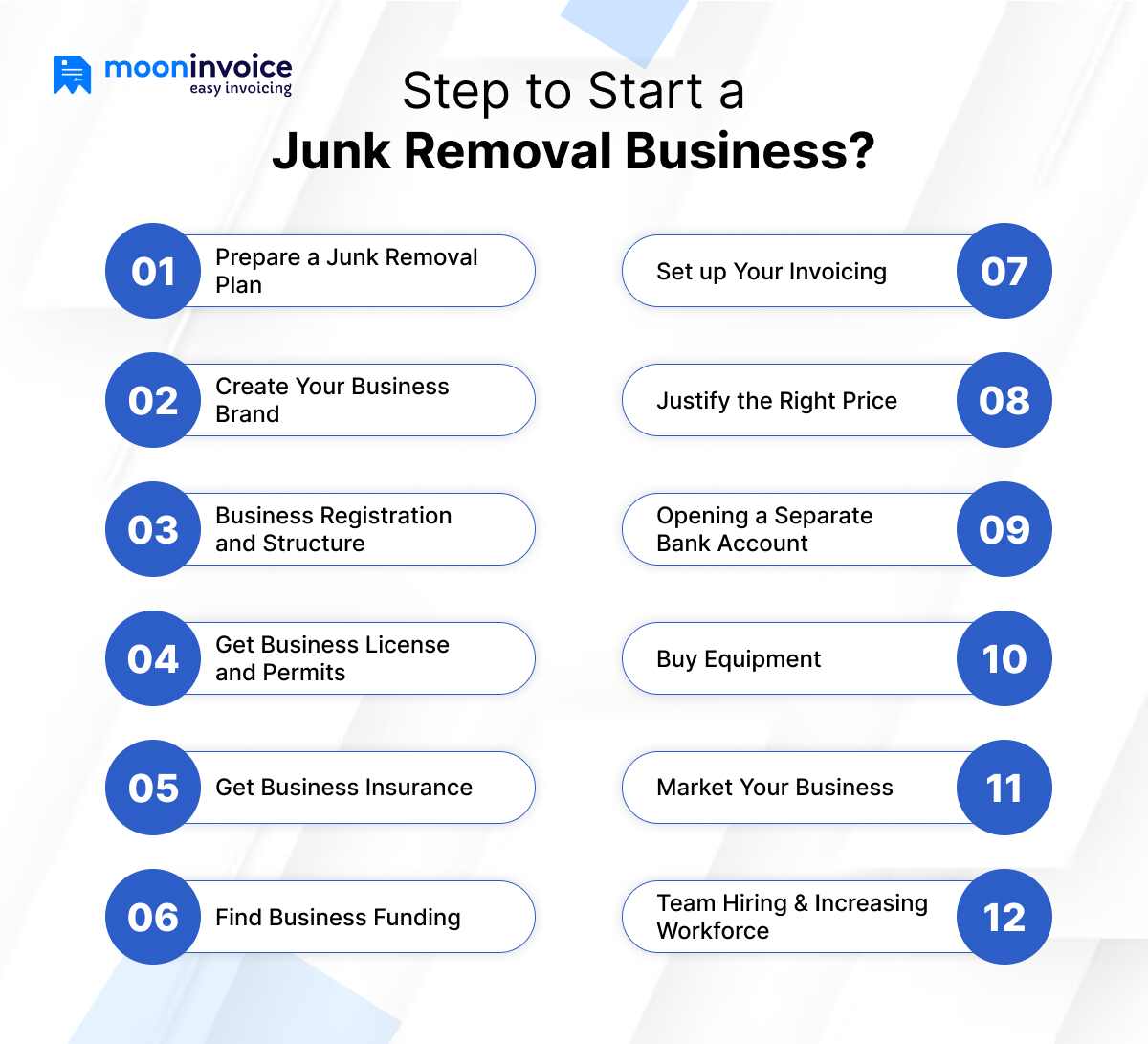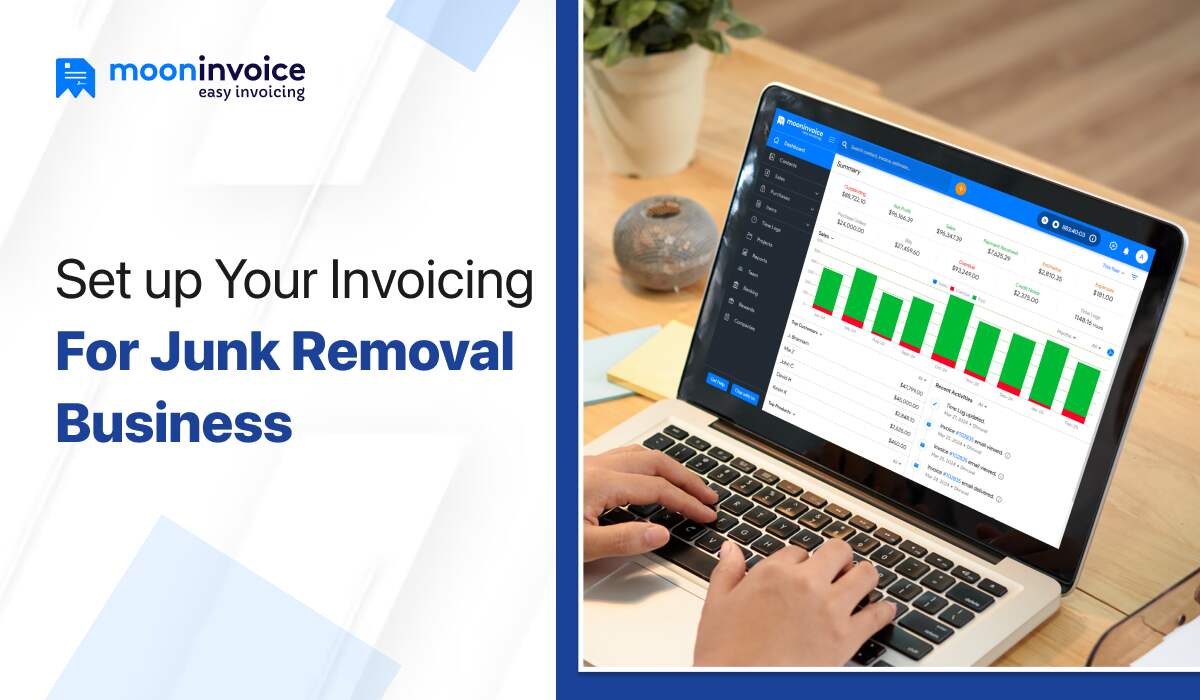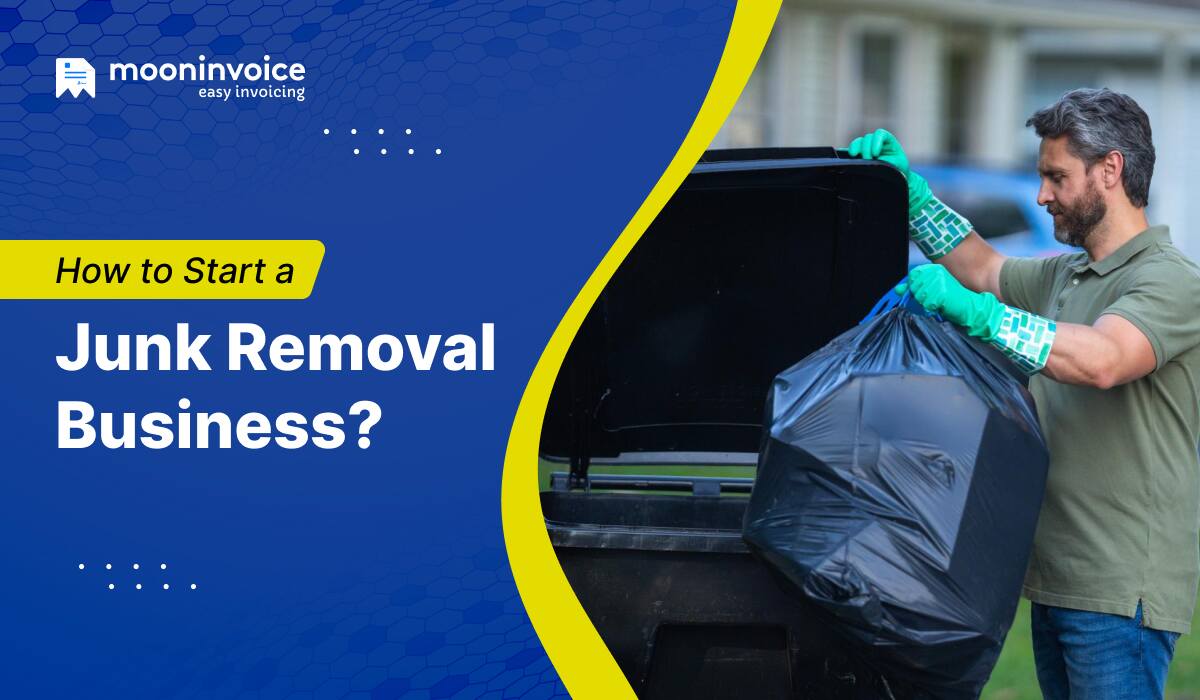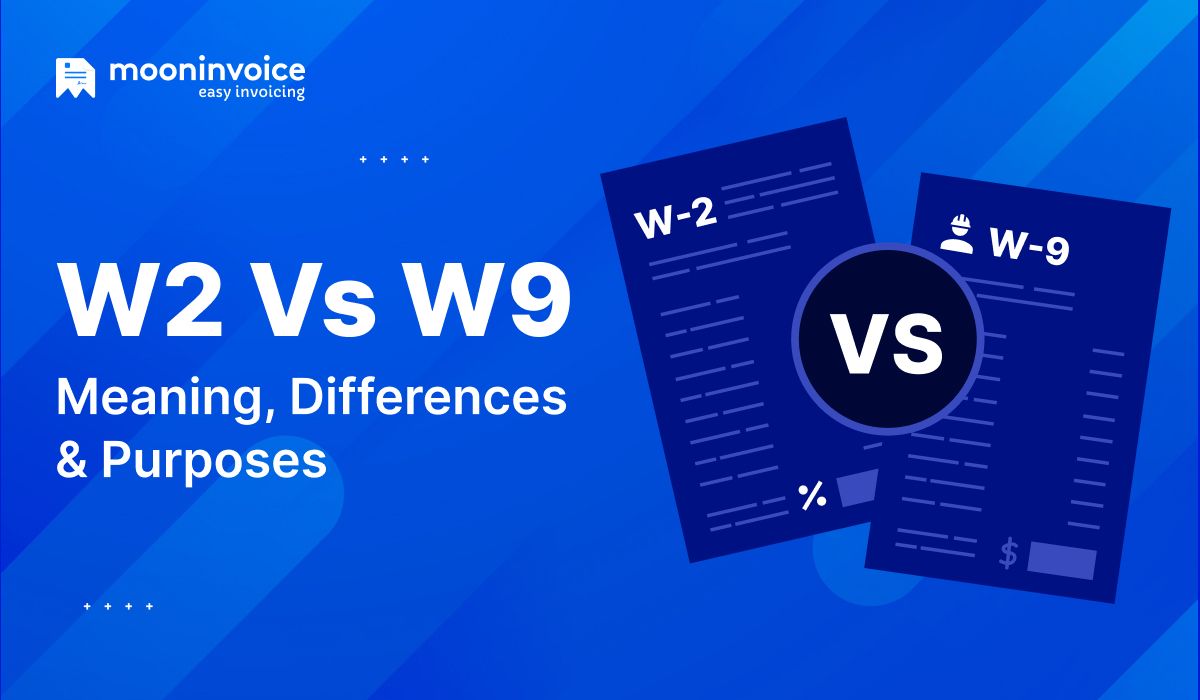Junk production is a part of daily life for Americans, which creates new opportunities for the growth of junk removal businesses.
Offering junk removal services can be a lucrative business opportunity, especially in the USA, where tons of waste are generated every year.
With the right planning and knowledge, one can easily convert trash into a source of income. Whether starting from scratch or opting for a franchise, this profession is profitable, demanding, & less competitive too.
According to Business Research Insights, the junk removal franchise market was valued at approximately USD 0.86 billion in 2024 and is expected to reach USD 2.45 billion by 2033.
Therefore, the above statistics highlight the optimal value of this business. However, a common question for most people is how to start a junk removal business.
Does the same happen with you? Then take a tour of our guide on starting a junk removal business. We’ll explore all the steps, explaining the strategy to start this business. Additionally, we will also showcase the startup costs associated with this profession.
📌 Key Takeaways
- Recycling or donation is a good option for eco-friendly junk removal businesses.
- Starting a junk removal business needs planning and the right business structure.
- It is essential to invest wisely in purchasing junk removal equipment.
- The junk removal profession is quite scalable.
- Junk removal business owners can easily expand their business by adding more vehicles, workers, and services.
- Using reputable invoicing software is beneficial for streamlining the accounting & invoicing process.
How to Start a Junk Removal Business?

The starting approach of a junk removal business is identical to that of any other business. Planning, investment, registration, and marketing are key milestones of this business journey. Additionally, don’t forget to add dedication & hard work. Here are the key steps to initiate your junk hauling business.
1. Prepare a Junk Removal Plan
The initial phase of the junk removal business is preparing the business plan. It includes detailed information about the junk removal service you’ll provide, the equipment you’ll utilize, and the staffing role. Additionally, it must also cover the marketing plan. The strategies for competing in the market should also be part of your plan.
Few Steps Towards Smooth Billing
Choose, customize, create, and send the perfect invoice on every junk removal deal with Moon Invoice.
2. Create Your Business Brand
Your business needs to establish a strong presence in the market through its identity. That is why your business should have a unique name, a catchy title or tagline, and a logo. You must ensure that you choose a unique business name that is not already in use elsewhere. For the logo, you can hire a logo designer who creates a catchy logo for your business.
3. Business Registration and Business Structure
Business registration is an important step in the junk removal business. You must register your business in your state’s regulations. There are many business structures available, as explained below:
Limited Liability Company (LLC) – Small businesses typically opt for an LLC, which is a good option to showcase your junk removal company as a legitimate business. Choosing the LLC is beneficial for the business because the personal assets remain safe during lawsuits or debt.
Sole Proprietorship – This type of business structure is useful for a one-person business. It is one of the easiest and cheapest ways to start a junk removal business.
Partnership – The Partnership business structure is a good option when there are two or more partners in the junk removal business.
4. Get Business License and Permits
You need a business license & permits are needed to operate your junk removal business legally. However, it depends on the state in which you are running your business. In some states, professionals are required to obtain special permits to dispose of biohazards, chemicals, and other hazardous substances.
One of the best ways to gain clarity on a junk removal business license is to refer to the Small Business Administration. From this, you can clearly check which licenses or permits are required.
Common licenses & permits are:
- Business licenses
- Commercial vehicle registration
- Waste carrier permit
- Dot Number
- Hazardous waste disposal permit
5. Get Business Insurance
Junk removal work involves high-risk tasks and is prone to mishaps. That is why it is necessary to have business insurance to protect yourself from any mishap. Junk removal business insurance is very helpful in covering losses that may happen during any trouble.
For the junk removal company, you can opt for any of the available business insurance options:
- General liability insurance
- Commercial auto insurance
- Workers’ compensation insurance
- Equipment insurance
6. Find Business Funding
Investments and funding are required to own a junk removal business smoothly. Therefore, it is crucial to select the appropriate funding sources. You can choose any fund source as per your convenience:
- Invest from the savings
- Take SBA (Small Business Administration) loans
- Collaborate with investors
- Opt for small business loans
- Invite friends and family members to invest in your business
- Business credit cards
7. Set up Your Invoicing
Invoicing is a crucial part of any business, and this also applies to the junk removal industry. Professionals should set up their invoicing for proper billing. This prevents junk removal businesses from experiencing improper cash flow, thereby promoting financial stability.

The reputable invoicing software is Moon Invoice. The platform offers over 66 customized invoice templates available in various formats. The user can obtain the template in Word, Excel, Google Sheets, Google Docs, and PDF formats.
Business professionals can effortlessly create a professional invoice for a junk removal service. Using the junk removal invoice template, you can create an accurate invoice, impress your client, and enhance your cash flow.
The invoice templates are fully customizable, allowing users to create a personalized invoice tailored to their specific requirements. The auto-calculation concept helps users obtain an accurate calculation of the total price. Thus, there is no space for errors.
From junk to final payment – streamline your invoicing.
Say no to late payments with Moon Invoice. Make a successful payment story with our customized invoice templates.
8. Justify the Right Price
The next step is setting up the right pricing structure. Ensure that your price includes all material, labor, and overhead costs. For the perfect price, you can conduct a market analysis, one of the best approaches to get a pricing idea. Mind it, sure, the price should not be too low or too high. Keep the pricing model simple and easy to understand for the customers. Mind it, sure, clients like transparency when it comes to the pricing of the service.
9. Opening a Separate Bank Account
To manage business finances separately, it is necessary to have a separate bank account. Mixing of personal & business assets is always at risk. So, it is necessary to have a separate business bank account to manage all your business finances in one place. This leads to systematic financial management and is also beneficial during the tax process.
💡Fun Facts:
Junk removal professionals can often find valuable items during the trash removal process, such as hidden cash in furniture.😂
10. Buy Equipment
Junk removal jobs are never complete without the right equipment. You’ll need the equipment for your business, which could cost around. However, you can opt for second-hand equipment, which can be more cost-effective than a new one. Common equipment needed for a junk removal business is:
Vehicles
- Box truck & pickup truck
- Trailer
Lifting & Moving Tools
- Loading ramps
- Bungee cords
- Furniture sliders
Safety Gear
- Steel-toe boots
- Work gloves
- Safety goggles
- Hard hats
- Dust masks/respirators
- Reflective vests
Storage & Container
- Plastic bins
- Buckets
- Large garbage cans
Cleaning Supplies
- Shovels, brooms, and rakes
- Tarps
Other Tools
- Basic tool kit
- Reciprocating saw
- Hammers
- Crowbars
💡Check Out:
11. Market Your Business
Once you’ve completed all the above steps, the next step is promoting your business. When it comes to business marketing, professionals must prepare their business website to showcase their commercial junk removal operations.
But that’s not enough at all. You also need to promote your website to increase the visitors and explore a wide range of audience. The wider you cover the audience, the greater the chance of getting clients.
Promoting your trash removal services on social media platforms like Facebook, X (formerly Twitter), & Instagram is also beneficial. Junk removal marketing should incorporate the latest marketing strategies to stay competitive.
Opting for paid campaigns, such as Facebook ads and local service ads, can be beneficial in quickly reaching the target audience. Meanwhile, don’t forget the word-of-mouth power that helps your business grow in the market through referrals.
12. Team Hiring & Increasing Workforce
You will no longer be running a one-person business for the rest of your life. As you expand your services and acquire new clients, you’ll need a team to handle all the tasks. That’s where hiring a team strategy comes into play. For a successful junk removal business, you might need the following staff:
- Labor
- Driver & operator
- Hauling crew & helper
- Dispatcher & scheduler
- Marketing specialist
- Recycling specialist
How Much Does it Cost to Start a Junk Removal Business?
The startup costs for a junk removal business can range from $1,500 to $300,000, depending on the services you offer. Here is the bifurcation of the cost:
- Vehicle: $26,000
- Basic tools: $600 to $1000
- Equipment: $6,000
- Office rent: $700 to $2,000
- Permits & License: $3500
- Insurance: $500 to $5,000
- Initial marketing: $2500
- Staffing & payroll: $12,000
- Other miscellaneous costs: $30 to $200 (per month)
💡Continue Your Reading:
Is Junk Removal Business Profitable?
The average gross profit margin in the junk removal business ranges from 45% to 60%, depending on factors such as efficiency, pricing, and disposal costs. Thus, the typical salary of a junk removal business owner varies widely. Business professionals can achieve a good profit margin by recycling or reselling waste instead of disposing of it. Additionally, an effective marketing strategy and efficient operations can contribute to increased profits.
The following are the key factors that make a junk removal business profitable:
Large Market
The increasing human population & redevelopment in urban areas set up a large & good market for junk removal professionals. Whether it is a home, a construction site, or an office, a good junk management solution is needed everywhere.
Low Competition
Compared to other industries, the junk removal business has a relatively low level of competition. Thus, it creates opportunities to gain a good customer base.
Scalable
The junk hauling business is scalable, allowing business owners to grow their operations. They can easily add vehicles, workforce, and services to grow their business.
Perfect Invoicing = Perfect Business
Over 66 junk removal invoicing templates of Moon Invoice are available to streamline your billing process.
End Note
So, how to start a junk removal business? Our words showcase sufficient knowledge on this question. Remember that starting a trash removal business is a highly profitable profession, and it requires dedication, solid planning, thorough market research, and effective marketing skills. Additionally, level up your invoicing process by collaborating with Moon Invoice. Are you curious how it works? Try this way!


















